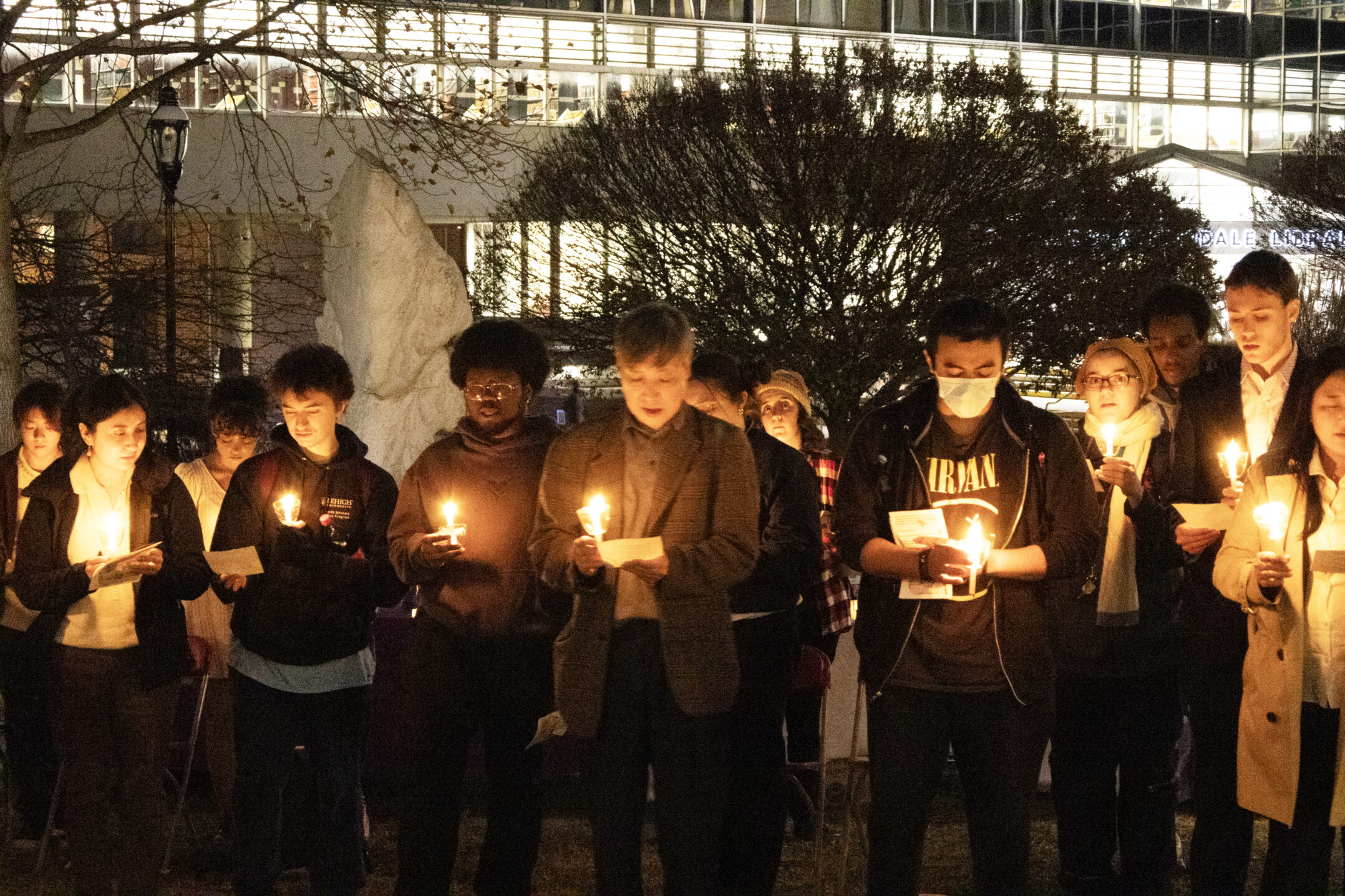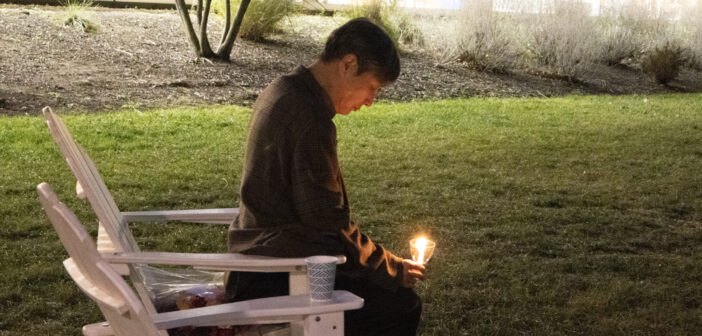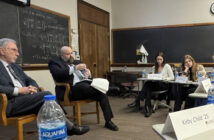Over 40 people gathered on the STEPS lawn this evening to honor alumna Victoria Lee, ‘21, who was shot by police officers on July 28. The vigil, organized by the Pride Center and Marcon Institute, brought together students, alumni, professors, and Lee’s family and friends in an effort to seek justice.
Lee was experiencing a mental health crisis at her home in Fort Lee, New Jersey, when her brother called twice for an ambulance to seek medical help at 1:25 a.m., according to a press release from New Jersey’s Department of Law and Public Safety.
In the initial call, the dispatcher insisted that both an ambulance and a police officer would be dispatched. When her brother requested only an ambulance, the dispatcher said officers are required to accompany mental health calls to ensure the safety of the ambulance staff.
Police officers arrived at her residence and spoke with Lee’s brother before opening the door, where they then saw Lee and her mother, who shut the door and didn’t allow them to enter. After Lee threatened to harm the police personnel, officers breached the door and commanded her to drop the “foldable” knife she was holding, according to the press release.
When Lee appeared at the door holding a water jug, one of the officers shot her in the chest, and according to the press release she was transported to Englewood Hospital and pronounced dead at 1:58 a.m.
A few months following the tragic event, the vigil aimed to celebrate the life of Lee while making a call to seek justice.
The event opened with a wishing star activity and a signing of the petition alongside Korean food available to attendees.
Scott Burden, director of the Lehigh Pride Center, began the speaker segment at the vigil. They said Lee found comfort in the relationships she built at Lehigh, and with the Pride Center.
Burden recalled Lee visiting their office unannounced and frequently and said the two discussed her aspirations for the future.
“She was just a bright spirit,” Burden said. “She was one of those people that made people feel comfortable, seen and loved.”
When Burden discovered that Lee had been shot, they turned to the Lehigh Pride Center for action.
They didn’t know where to start, so Burden said they reached out to Lee’s best friend, Rei Ukon, ‘21, who then connected them to AAPI New Jersey. He said the group had their first meeting about a month ago.
Holona Ochs, the director of the Marcon Institute and a professor of political science, said the Pride Center took the lead in organizing the vigil coordinating closely with Lee’s family to ensure the vigil honored her memory in the way they desired.
Ochs said she felt compelled to reach out at the beginning of the semester to Burden and who she knew would care about hosting a vigil for Lee.
“We can’t have someone from our community be violently taken from us and not have acknowledgment of it,” Ochs said. “This is what communities do. When we lose somebody, it doesn’t only matter if you knew them but that you care — that was somebody who contributed to this campus and it affects us all.”

Students, faculty, professors, family and friends gathered around K.Y. Lee (middle), Victoria Lee’s father, during the vigil commemorating Lee’s life early this evening. The vigil was held on the STEPS lawn and organized by the Pride Center and Macron Institute. (Caitlyn Hall/B&W Staff)
The Lee family is currently seeking both criminal and civil cases in the State of New Jersey.
In December 2021, the state of New Jersey’s Department of Law and Public Safety implemented the ARRIVE Together program in all 21 counties.
“A State Trooper trained in crisis intervention and de-escalation techniques is paired with a mental health screener and crisis specialist to respond to 911 calls involving behavioral health incidents,” according to the Arrive Together program website.
Ochs said a mental health crisis is a momentary thing “that can come over you like a wave,” and while these crises are treatable, she said using a weapon isn’t the way to treat them.
She said police aren’t trained to deal with mental health crises, as they respond with their training on the continuum of force, which can escalate the conflict when people are in crisis.
“They are trained to meet force with more force,” Ochs said. “When you do that you cause a person in a mental health crisis to feel terrified. Imagine you are struggling with your sense of reality and people with guns come at you and they’re yelling at you.”
K.Y. Lee, Victoria’s father, attended and spoke at the vigil. He recalled helping Victoria Lee move into her dorm during her first year at Lehigh in 2017.
The Lee family immigrated to New Jersey from Korea when Victoria Lee was five, and K.Y. Lee said she was immensely proud of her Korean heritage.
“There are so many things about her to say,” he said. “She really loved music.”
Ukon, who helped organize the vigil, said he bonded with Lee over their love for music.
“As artists, we were drawn to each other,” Ukon read from the pamphlet he wrote for the event. “And she shared her art with me all of the time. Writing songs for special occasions, sending me her latest tracks (and) performing for her friends. Her gifts to this world were never-ending.”
K.Y. Lee believes that, compared to other countries, seeking justice in the U.S. for victims and their families takes too long because of the judicial system.
“The person who is responsible for my daughter’s death should be put to justice,” he said. “She should have been treated with dignity.”
The Lee family released a statement immediately after Victoria’s death, calling out “unjust points” during “what had been a calm and non-threatening situation into a dangerous one.” The family is urging that the New Jersey Office of the Attorney General conduct a thorough investigation after the initial one.
K.Y. Lee said the waiting time since the first investigation retraumatizes the family, as they constantly relive the events on July 28 and deepen their sadness.
The Hall family, Fe and Gareth Hall, also attended to show their support with the Lee family because they lost their son four years ago after he suffered from a mental health crisis.
The couple lost their son Christopher Hall in 2020 when he was shot by a police officer three times in the chest.
Ochs, who has studied police use of lethal force, said we need to invest in expanded crisis intervention for police to prevent these tragedies from happening.
She said there are promising solutions like enhancing officer access to crisis intervention training, expanded co-response models and investments in community response models.
“I have been working for several years with the City of Bethlehem and Allentown (in an effort) to demonstrate to them that there is sufficient evidence to invest in expanded crisis intervention training for police,” Ochs said. “There are many pilot programs of co-response models where helping professionals respond to calls for help instead of the police, or alongside them.”
Additional speakers included Dr. Nobuko Yamasaki, an associate professor of Japanese and advisor to Victoria Lee’s minor. A student also spoke on behalf Victoria Lee’s friend, who couldn’t attend, and on behalf of others who didn’t know Lee personally but resonate with her story.
Following these speakers, Dr. Ochs, and Dr. Yamasaki alongside members of the Pride Center collaborated in lighting candles.
Burden invited attendees to join them in a moment of silence and sing “Amazing Grace.”
They wanted attendees to leave with an overarching message. “We have to get to the root of the issue: Victoria should be here today and she’s not,” Burden said.
To support the Lee family and their search for legal justice, visit this site.






Comment policy
Comments posted to The Brown and White website are reviewed by a moderator before being approved. Incendiary speech or harassing language, including comments targeted at individuals, may be deemed unacceptable and not published. Spam and other soliciting will also be declined.
The Brown and White also reserves the right to not publish entirely anonymous comments.